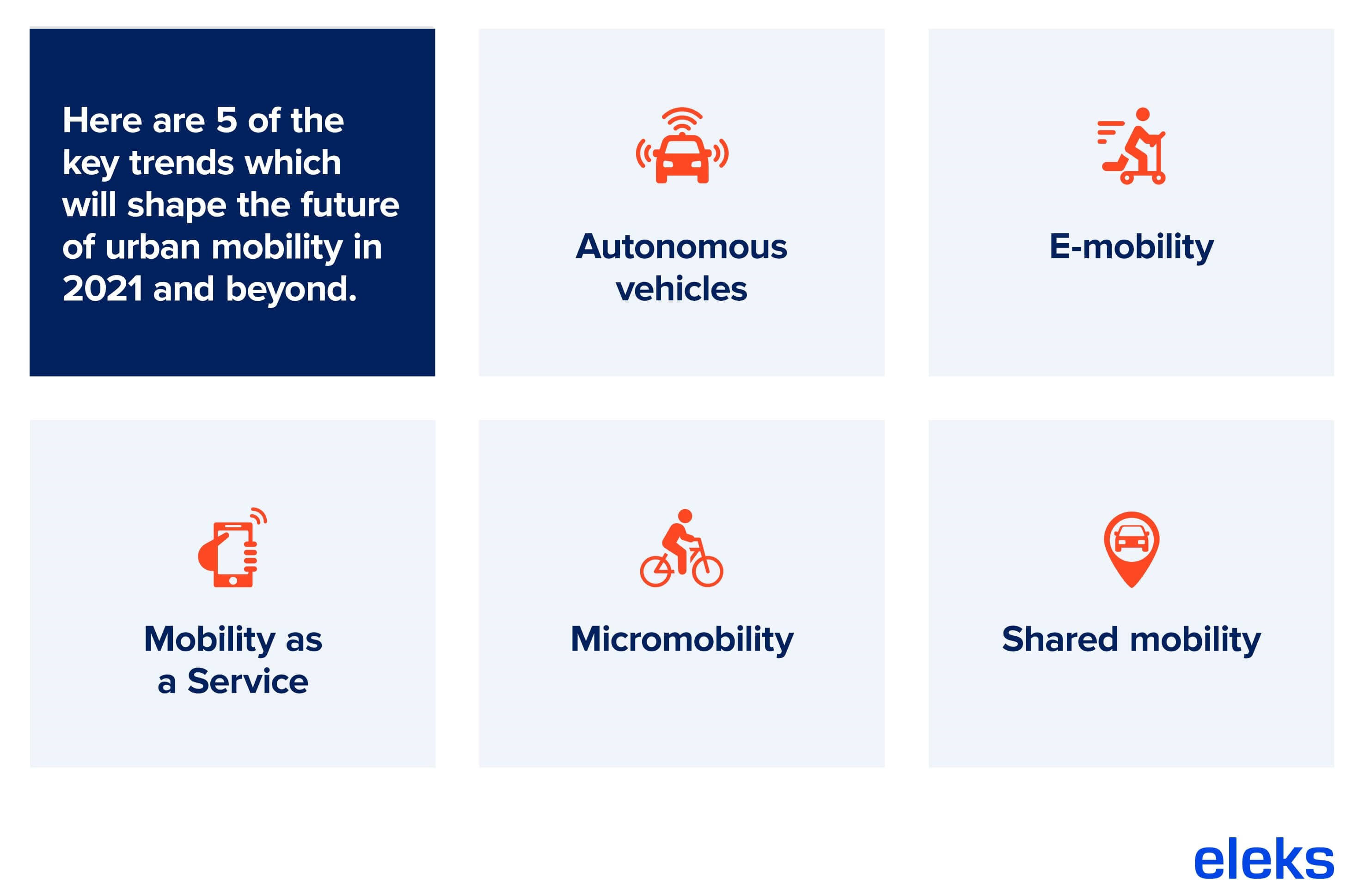
Bosch notes that, by the end of 2020, around 70% of the global population will dwell in cities. These urban environments, which are already bursting at the seams, will struggle to operate as the number of people entering them increases. Here are five of the key trends, which we anticipate will shape the future of urban mobility.

Autonomous vehicles
Speaking about the future of urban mobility, autonomous vehicles are among the first trends to come to one's mind. The driverless vehicle, or AV, market is currently valued at approximately $54 billion. That’s set to increase tenfold within the next decade, as technologies that enable automated car manufacture become more sophisticated and readily available.
Currently, there are around 1,500 self-driving cars on the road in the US but, with big automakers including Toyota, Honda, BMW and Renault ploughing investment into driverless functionality, the market is set to boom. German automotive behemoth, Audi, has plans to invest around $16 billion in its autonomous vehicles by 2030.
There are five levels of automation, from level 1, which offers some of the driver assist functionality we already see on the roads, to 5 which will, eventually, offer a fully autonomous “robot vehicle” – taking complete control of the driver’s seat. The levels breakdown as follows:
- Level 1: Driver assistance - the vehicle is controlled by the driver but offers some driver-assist functionality.
- Level 2: Partial automation - the vehicle requires the driver to remain engaged behind the wheel but offers some combined automated functions, including acceleration and steering.
- Level 3: Conditional automation - the vehicle is able to monitor the environment but the driver must be ready to take control in a split second.
- Level 4: High automation - the vehicle can perform all driver functions, depending on certain conditions, and the driver has the option to take over.
- Level 5: Full automation - the vehicle can perform all driver functions in every type of environment/condition, but the driver has the option to take charge of the wheel if they wish.
Some of the key benefits of driverless technology include:
- Reduction in accidents - According to the United States Department of Transportation, human error accounts for 94% of road traffic accidents. By eliminating human error, billions of dollars worth of accident and fatality payments could be saved, productivity within the workplace increased and the social burden of living with injury/coping with loss, eased.
- Smoother traffic flow through congested areas - autonomous vehicles can facilitate better road cooperation in heavy traffic, allowing drivers to save hours spent in traffic jams and, thus, spend more time at home with their families.
- Enabling social independence - millions of people across the globe live either physically isolated or isolated by a disability and, in many cases, the key to them living independently is the ability to drive. With vehicle autonomy, many millions more will have access to employment and social interaction which may have otherwise been denied them.
E-mobility
The climate crisis has highlighted the poor and, in some cases, illegal air quality in many of the world’s large cities. Today, there are around 500 “megacities” – some with over 20 million inhabitants consuming around 70% of the world’s energy resources. The rail, subway and road networks servicing these metropolises are no longer adequate to support their expanding populations. According to a study by the UK’s Office of National Statistics, around a fifth of the country’s greenhouse gas emissions came from road transport in 2017 – up 6% since 1990. So the problem needs to be tackled at household level.
Modern internal-combustion engines have come a long way since their first iterations. They are far less polluting but don’t offer a complete solution for better air quality. Vehicle electrification, however, does.
In the Netherlands and, particularly, Amsterdam, inhabitants are experiencing better air quality due to the rapid installation of e-car infrastructure, to support an urban transition to electric transportation. The city has gone so far as to build individual e-car charge points, in instances where e-vehicle owners don’t have their own readily equipped parking spot. And across the Netherlands, Statista recorded almost 41,000 electric charge points for vehicles, as of 2019.
In China, there are currently around 330,000 charge points for electric vehicles and growing, with the country now producing almost 60% of the world’s “new energy vehicles”. Electromobility is no longer a fringe technology. It will fundamentally alter urban mobility in the near future.

Mobility as a Service
Our urban landscapes no longer favour the pedestrian, they’ve been carved up by major road routes and congested with lanes of pollution-emitting traffic. The leaders of the world’s major cities want to see their streets repurposed to support a better quality of life and cleaner air – where previously gridlocked streets could be pedestrianised and turned into much-needed living space, equipped with bike lanes, shops, restaurants and parks.
This has sparked an upsurge in innovative businesses investing in Mobility as a Service (MaaS). This includes bike and car-share schemes, taxi services and vehicle rental, offering a consumer-centric approach to urban mobility. MaaS is an on-demand plaform which uses Big Data and open-source data to offer a real-time consolidated view of different transport options, as well as simplified route planning and payment. Sweden’s UbiGo launched in 2019, pioneering an app which shows all public transport, car-share, taxi and car rental services available to the user, then offers them a mobility subscription service to pay for their journeys. The model was so successful in Stockholm that it has now been rolled out in Gothenburg.
By simplifying the method of finding and paying for transportation on-demand, using big data and two-way communication while continually seeking and implementing user feedback, MaaS solutions could replace individual car ownership for those living in cities.
Micromobility
Reinforcing the lean toward MaaS solutions to free-up valuable street space, a plethora of innovative companies are developing personal mobility devices and light electric vehicles for the masses, which take up far less square-footage than traditional motor vehicles. Technological advances have allowed manufacturers to shrink electric motors and compact their batteries to develop e-scooters and EVs which tackle the double threat of pollution and congestion.
In San Fransisco in 2018, startup company Bird deployed a fleet of electric scooters onto city streets, with unprecedented uptake. Fast-forward to 2020 and, according to a report by Europe’s MotorCycles Data, the electric two-wheeler market has leapt by 11% in the first nine months of this year. Sales of e-scooters hit 75,000 across 28 continental countries (including the UK), jumping by a straggering 36.6% in the third quarter of the year.
Demand has been boosted by COVID-19, which has deterred many people from using public transport to get from A to B. Now, it seems that personal mobility devices are here to stay, with the public sector needing to come up with robust policies on where they can/should be ridden and where to store them safely when not in use.
And, where individuals need a mobility option that allows them to carry more than just themselves, light electric vehicles offer a compact footprint for ideal use in urban environments, while still offering the functionality of a car.

Shared mobility
We’ve briefly touched on vehicle sharing already, but shared mobility across all modes – carsharing, ride-hailing scooter or bike-sharing services – could dramatically improve our urban landscapes and air quality. There has been a huge increase in companies offering these kinds of services in recent years – Uber, Drive Now, Zipcar, etc. – made easier by the proliferation of data.
Now, big OEM players including Toyota, General Motors, Daimler AG and BMW Group have launched their own carsharing services. And the offering is becoming increasingly flexible too, with companies providing various options including round-trip and free-floating services, with evermore complex pricing plans.
Shared mobility services, implemented as a city-wide framework, can provide people with convenient, door-to-door transportation for a price that’s comparable to public transport, while negating the need for individual car ownership. This, in turn, creates more space for public facilities, leads to better air quality and reduces the burden on natural resources.
Conclusion
As we grapple with the unstoppable growth of our cities and the climatic and social implications of such spaces, innovative businesses must collaborate with the public sector in order to reimagine the future of urban mobility. The wealth of Big and open-source data available now can provide flexible public and private transport solutions that reduce the need for standard, pollution-emitting personal vehicles and outdated, difficult/expensive to maintain rail and subway networks.
There is no one-size-fits-all model, however. Each city must really evaluate its current state vs what its residents need, in order to come up with the urban mobility solution that best fits its population.
Whether you’re an automotive disruptor or a public sector servant, see how ELEKS can help you revolutionise urban mobility for a better tomorrow. Contact us today.
Related Insights







The breadth of knowledge and understanding that ELEKS has within its walls allows us to leverage that expertise to make superior deliverables for our customers. When you work with ELEKS, you are working with the top 1% of the aptitude and engineering excellence of the whole country.

Right from the start, we really liked ELEKS’ commitment and engagement. They came to us with their best people to try to understand our context, our business idea, and developed the first prototype with us. They were very professional and very customer oriented. I think, without ELEKS it probably would not have been possible to have such a successful product in such a short period of time.

ELEKS has been involved in the development of a number of our consumer-facing websites and mobile applications that allow our customers to easily track their shipments, get the information they need as well as stay in touch with us. We’ve appreciated the level of ELEKS’ expertise, responsiveness and attention to details.

